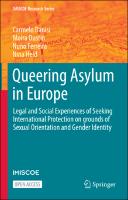Queering Asylum in Europe
Legal and Social Experiences of Seeking International Protection on grounds of Sexual Orientation and Gender Identity
Author(s)
Danisi, Carmelo
Dustin, Moira
Ferreira, Nuno
Held, Nina
Language
EnglishAbstract
This two-volume open-access book offers a theoretically and empirically-grounded portrayal of the experiences of people claiming international protection in Europe on the basis of their sexual orientation or gender identity (SOGI). It shows how European asylum systems might and should treat asylum claims based on people’s SOGI in a fairer, more humane way. Through a combined comparative, interdisciplinary (socio-legal), human rights, feminist, queer and intersectional approach, this book examines not only the legal experiences of people claiming asylum on grounds of their SOGI, but also their social experiences outside the asylum decision-making framework. The authors analyse how SOGI-related claims are adjudicated in different European frameworks (European Union, Council of Europe, Germany, Italy and UK) and offer detailed recommendations to adequately address the intersectional experiences of individuals seeking asylum. This unique approach ensures that the book is of interest not only to researchers in migration and refugee studies, law and wider academic communities, but also to policy makers and practitioners in the field of SOGI asylum.
Keywords
Open access; Sexual orientation or gender identity (SOGI); European asylum systems; Homophobia and transphobia; SOGI-related asylum claims; Human rights violations; Law, policy and practice; Migration and integration; Refugees; Sexual diversityDOI
10.1007/978-3-030-69441-8ISBN
9783030694418, 9783030694418Publisher
Springer NaturePublisher website
https://www.springernature.com/gp/products/booksPublication date and place
2021Imprint
SpringerSeries
IMISCOE Research Series,Classification
Migration, immigration and emigration
Relating to migrant groups / diaspora communities or peoples
Human rights, civil rights
Public administration
Gender studies, gender groups


 Download
Download Web Shop
Web Shop